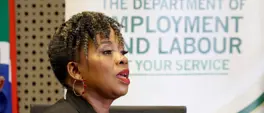MALAIKA MAHLATSI | The hypocrisy of the remuneration narrative in the public vs private sectors
Malaika Mahlatsi
10 September 2025 | 12:41'We have accepted the narrative that poor governance, corruption and remuneration disparities happen only in the public sector,' writes Malaika Mahlatsi.
- Woolworths
- Remuneration
- Public Investment Corporation (PIC)
- Pension funds
- Government Employees Pension Fund (GEPF)

Picture: Albund/123rf.com
In the past few days, two interesting stories were published, with one causing uproar and another going completely ignored, despite their glaring similarities.
The first story was about the remuneration of the Chief Executive Officer of Woolworths, Roy Bagattini, who was paid an astounding R80 million for the financial year ended 30th June 2025.
He received a base salary of R19.6 million and benefits of R4.7 million, with a guaranteed pay package of R24.3 million.
While Bagattini did not receive a performance bonus, he did receive R12 million in long-term incentives, taking his total remuneration to R36.5 million. However, this rose to R79.9 million when looking at his single-figure remuneration.
Single-figure remuneration includes the vesting of shares with performance conditions, and consists of any income that is attributed to unvested long-term share schemes.
The R79.9 million that Bagattini received is an increase of just over R14.5 million from the previous year, when he earned R65.3 million.
Several other executives at Woolworths also receivedincreases in their remuneration.
What is interesting is that in the same financial year that Woolworths executives had their remunerations increased by millions of rands, the Woolworths Group reported negative earnings. The group’s earnings declined by 5.5 percent.
Headline earnings per share also fell by 26.4 percent. With the drop in earnings, the group’s total dividend fell from 265.5 cents per share in 2024 to 188 cents per share in the 2025 financial year.
When a company's shares fall, shareholders experience a decrease in the value of their investment, potentially leading to financial losses, especially if they sell their shares at a lower price than they bought them.
This drop in value reduces the future income they might receive from pensions or investments. To understand why this matters, we must consider who the shareholders of the Woolworths Group are. The largest shareholder is the Public Investment Corporation (PIC), which recently increased its stake to just over 20 percent.
The PIC represents the South African government and its pension fund. Other shareholders are diverse and include domestic and international asset managers and individual investors.
The PIC, a state-owned entity, is not only responsible for investing in the Government Employees Pension Fund (GEPF) in South Africa, but it is also a key entity through which the government implements its policy of Broad-Based Black Economic Empowerment – a form of affirmative action which aims to facilitate broader participation in the economy by black people.
Thus, when the Woolworths Group pays its CEO tens of millions of rands while shareholders lose their investments, it is not some faceless people who are impacted. It is ordinary people who have spent years working in the public service.
Juxtapose the Woolworths Group remuneration story with that which has been given greater focus – the remuneration paid to members of water boards in South Africa.
An article published over the weekend by the Sunday Times with the heading, "Splashing out: Dry taps as water boards drown in excess",details how members of water boards earn almost R50 million per annum in board fees, with some being paid as much as R100,000 per meeting. The article argues that some of the top-earning water boards’ members include chairpersons of boards plagued by governance failures.
There is no question that some of the water boards in our country are near dysfunctional, with governance and financial management mechanisms all but broken.
And it is true that when water boards fail, there is a direct impact on water security, even as these entities are mainly responsible for bulk water supply to municipalities rather than direct supply to households.
I have argued in several articles that in the case of functional entities such as Rand Water, which provides bulk water to Gauteng and various parts of Mpumalanga, the North West and the Free State, the main problem is not the water utility but governance failures by municipalities, anchored on maintenance failures and inadequate budgets for water infrastructure development.
However, poor governance at board level is calamitous. The primary role of the board of directors of the country’s seven water boards is to provide governance and strategic oversight, ensuring compliance with legal and regulatory frameworks, and aligning the organisations with national development objectives. They approve the company's budget, set strategy, and ensure ethical conduct and financial sustainability.
Thus, when these boards of directors fail, the water boards themselves cannot succeed. Conversely, when a water board has a competent board of directors, the outcome is good governance and good financial management.
This is evident with the Rand Water board of directors, whose relevant and advanced skills and qualifications have ensured that the entity meets and often exceeds its key performance indicators.
The bulk water utility achieved an unqualified audit outcome in the 2024/2025 financial year, a growth of 11.42 percent in revenue (translating to R21.82 billion) and received an AA+ positive outlook from Fitch Ratings.
There is no question therefore, that boards of directors play a crucial role in ensuring the stability of organisations.
This said, there is hypocrisy in arguing that boards of directors in water boards are over-paid in the midst of South Africa is experiencing a water security crisis, while failing to make the same argument about how executives in companies like the Woolworths Group rake in tens of millions of rands while shareholders are losing money due to falling dividends (which are attributable to both economic/market conditions and poor strategic direction).
Some people argue that water boards are paid by taxpayers, but conveniently ignore the fact that shareholders in private companies such as the Woolworths Group are also taxpayers, with the largest shareholder representing public servants such as teachers, nurses, police officers and administrators.
When excess happens in the private sector where executives are overpaid, those who pay the price are not just wealthy individuals who have the means to invest.
They are also ordinary workers whose pensionsdepend on the actions of those private companies. They are also Black people who must rightfully be included in the formal economy through affirmative action mechanisms.
To treat the Woolworths Group remuneration story differently to that of water boards is to perpetuate the dangerous narrative that the actions of the private sector have no impact on ordinary people – that good governance must only matter in the public sector.
This narrative ignores the fact that poor governance, maladministration, corruption and ineptitude in the private sector impacts the public sector too. This was laid bare in the Zondo Commission, where it became clear that the private sector is at the centre of corruption in the public sector, and that the victims of this incestuous relationship are ordinary South Africans. We have accepted the narrative that poor governance, corruption and remuneration disparities happen only in the public sector.
As a result, we turn a blind eye when the same issues are exposed in the private sector – in partbecause such stories are never elevated to national discourse even by the media. This has allowed the private sector to get away with problematic conduct and actions that are never critiqued.
It is not only the mark of hypocrisy, but is the fuel that enables the private sector to enjoy the impunity and lack of scrutiny that it does not only with investors’ money but with the money of public servants who toil for many years only to have their pensions eroded by the actions of companies that we never hold accountable when we should.
Malaika Mahlatsi is a geographer (with expertise in urban geography and water resource governance) and researcher at the Institute for Pan African Thought and Conversation. She is a PhD in Geography candidate at the University of Bayreuth in Germany.
Get the whole picture 💡
Take a look at the topic timeline for all related articles.

















